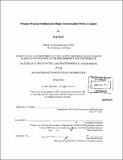Private finance initiative and major construction firms in Japan
Author(s)
Kato, Koji, 1964-
DownloadFull printable version (20.38Mb)
Other Contributors
Massachusetts Institute of Technology. Dept. of Civil and Environmental Engineering.
Advisor
Fred Moavenzadeh.
Terms of use
Metadata
Show full item recordAbstract
The Japanese construction industry has long been in recession, and the recession is predicted to continue into the future because both national and local governments lack the necessary resources. The "Private Finance Initiative" (PFI), which utilizes the private sector's technical, financial, and managerial resources to deliver more efficient and higher quality public facilities, has recently been launched in Japan with a special enactment. The PFI gives substantial opportunities to many Japanese industries, and especially to major construction firms (MCFs), which have collective strength and experience in developing technologies and projects. However, since participants in a PFI project must invest in the project as a whole, only those who can evaluate, manage, and properly assume the involved risks deserve the opportunity. Based on the background of the Japanese construction industry and the findings from the case studies relevant to the private toll road project or the Japanese PFI, this thesis develops a framework for prospective toll road/bridge/tunnel projects utilizing the Japanese PFI scheme. For the viable types of projects (such as bridges/tunnels or bypass road projects with technically complicated structures and sufficient traffic volume projections), this thesis identifies project structures that are desirable with regard to government supports and risk sharing. A real public-private partnership, which implies joint efforts and initiatives with eagerness to implement the Japanese PFI, is always essential to the development of such a PFI project. This thesis also proposes two strategies for an MCF to face the Japanese PFI. Differentiation strategy may be attained through financial strength, special talent and experiences, differentiated technologies and patents, and proper equipment. Under certain conditions, such as if the project includes a large potential to develop innovative construction means, MCFs should consider an equity contribution strategy to exploit equitable returns. Simulations of a prospective toll bridge project are also applied in the thesis to test the viability of the framework and the strategies.
Description
Thesis (S.M.)--Massachusetts Institute of Technology, Dept. of Civil and Environmental Engineering, 2001. Includes bibliographical references (p. 240-244).
Date issued
2001Department
Massachusetts Institute of Technology. Department of Civil and Environmental EngineeringPublisher
Massachusetts Institute of Technology
Keywords
Civil and Environmental Engineering.